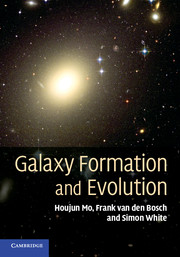Book contents
- Frontmatter
- Contents
- Preface
- 1 Introduction
- 2 Observational Facts
- 3 Cosmological Background
- 4 Cosmological Perturbations
- 5 Gravitational Collapse and Collisionless Dynamics
- 6 Probing the Cosmic Density Field
- 7 Formation and Structure of Dark Matter Halos
- 8 Formation and Evolution of Gaseous Halos
- 9 Star Formation in Galaxies
- 10 Stellar Populations and Chemical Evolution
- 11 Disk Galaxies
- 12 Galaxy Interactions and Transformations
- 13 Elliptical Galaxies
- 14 Active Galaxies
- 15 Statistical Properties of the Galaxy Population
- 16 The Intergalactic Medium
- A Basics of General Relativity
- B Gas and Radiative Processes
- C Numerical Simulations
- D Frequently Used Abbreviations
- E Useful Numbers
- References
- Index
3 - Cosmological Background
Published online by Cambridge University Press: 05 June 2012
- Frontmatter
- Contents
- Preface
- 1 Introduction
- 2 Observational Facts
- 3 Cosmological Background
- 4 Cosmological Perturbations
- 5 Gravitational Collapse and Collisionless Dynamics
- 6 Probing the Cosmic Density Field
- 7 Formation and Structure of Dark Matter Halos
- 8 Formation and Evolution of Gaseous Halos
- 9 Star Formation in Galaxies
- 10 Stellar Populations and Chemical Evolution
- 11 Disk Galaxies
- 12 Galaxy Interactions and Transformations
- 13 Elliptical Galaxies
- 14 Active Galaxies
- 15 Statistical Properties of the Galaxy Population
- 16 The Intergalactic Medium
- A Basics of General Relativity
- B Gas and Radiative Processes
- C Numerical Simulations
- D Frequently Used Abbreviations
- E Useful Numbers
- References
- Index
Summary
Cosmology, the branch of science dealing with the origin, evolution and structure of the Universe on large scales, is closely related to the study of galaxy formation and evolution. Cosmology provides not only the space-time frame within which galaxy formation and evolution ought to be described, but also the initial conditions for the formation of galaxies. Modern cosmology is founded upon Einstein's theory of general relativity (GR), according to which the space-time structure of the Universe is determined by the matter distribution within it. This perspective on space-time is very different from that in classical physics, where space-time is considered eternal and absolute, independent of the existence of matter.
A complete description of GR is beyond the scope of this book. As a remedy, we provide a brief summary of the basics of GR in Appendix A and we refer the reader to the references cited there for details. It should be emphasized, however, that modern cosmology is a very simple application of GR, so simple that even a reader with little knowledge of GR can still learn it. This simplicity is owing to the simple form of the matter distribution in the Universe, which, as we have seen in the last chapter, is observed to be approximately homogeneous and isotropic on large scales. We do not yet have sufficient evidence to rule out inhomogeneity or anisotropy on very large scales, but the assumption of homogeneity and isotropy is no doubt a good basis for studying the observable Universe.
Information
- Type
- Chapter
- Information
- Galaxy Formation and Evolution , pp. 100 - 161Publisher: Cambridge University PressPrint publication year: 2010
